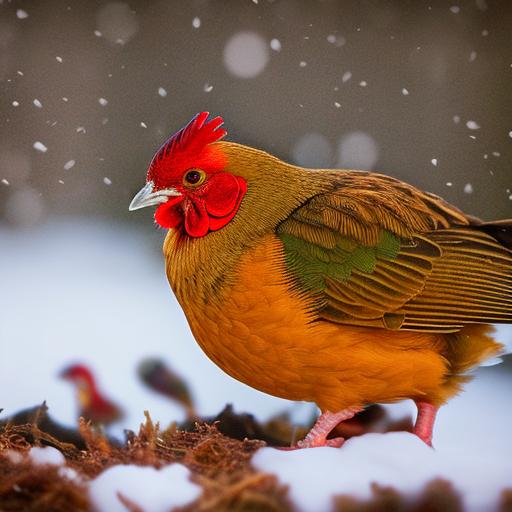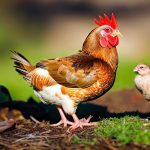Winter can be a challenging time for chicken owners, as the cold weather can be tough on our feathered friends. Chickens are sensitive to temperature changes, and extreme cold can cause them to become stressed or even sick. However, with a little bit of preparation and care, you can keep your chickens warm and healthy throughout the winter months.
Key Takeaways
- Proper heating in chicken coops is crucial for the health and well-being of your chickens during winter.
- Choosing the right type of chicken coop and insulating it properly can help keep your chickens warm and comfortable.
- Adequate ventilation is important to prevent moisture buildup and ensure good air quality in the coop.
- Artificial heat sources such as heat lamps or heaters can be used, but must be used safely and monitored closely.
- Providing warm bedding, proper nutrition, access to sunlight and exercise, and monitoring for signs of cold stress or illness are all important factors in keeping chickens warm in winter.
Understanding the Importance of Proper Heating in Chicken Coops
Proper heating in the chicken coop is essential to keep your birds comfortable and healthy during the winter. Chickens are not able to regulate their body temperature as efficiently as mammals, so they rely on their environment to provide them with warmth. If the temperature drops too low, chickens can suffer from cold stress, which can lead to decreased egg production, poor growth, and even death.
To ensure proper heating in your chicken coop, it’s important to monitor the temperature regularly. The ideal temperature for chickens is between 50-70 degrees Fahrenheit. If the temperature drops below this range, you may need to provide additional heat sources such as heat lamps or radiant heaters. It’s important to place these heat sources in a safe location where they cannot come into contact with flammable materials or be knocked over by the chickens.
Choosing the Right Type of Chicken Coop for Winter
When selecting a chicken coop for winter, it’s important to choose one that is well-insulated and draft-free. A coop with a solid roof and walls, as well as windows that can be closed, will help keep your chickens warm and dry. Insulation is key in preventing heat loss and maintaining a comfortable temperature inside the coop.
Additionally, consider the size of your flock when choosing a coop. Overcrowding can lead to increased moisture levels and poor air quality, which can make chickens more susceptible to respiratory problems. Make sure your coop has enough space for your chickens to move around comfortably and access their food and water without overcrowding.
Insulating Your Chicken Coop for Winter
Insulating your chicken coop is an important step in keeping your birds warm during the winter. You can use a variety of materials, such as foam board or fiberglass insulation, to insulate the walls, roof, and floor of your coop. It’s important to seal any gaps or cracks in the coop to prevent drafts.
When insulating your coop, pay special attention to the areas where heat loss is most likely to occur, such as windows and doors. You can use weatherstripping or caulk to seal these areas and prevent cold air from entering the coop. Additionally, consider adding insulation to the floor of the coop to prevent cold air from seeping up from the ground.
Providing Adequate Ventilation in Your Chicken Coop
While insulation is important, it’s also crucial to provide adequate ventilation in your chicken coop. Good ventilation will help prevent moisture buildup, which can lead to respiratory problems in chickens. It’s important to strike a balance between insulation and ventilation to ensure a healthy environment for your birds.
To provide adequate ventilation, consider installing vents or windows that can be opened and closed as needed. This will allow fresh air to circulate while still maintaining a comfortable temperature inside the coop. It’s important to monitor the humidity levels inside the coop and adjust ventilation accordingly.
Using Artificial Heat Sources to Keep Chickens Warm in Winter

In addition to insulation and ventilation, you may need to use artificial heat sources to keep your chickens warm in extreme cold. Options include heat lamps, radiant heaters, and heated waterers. When using heat lamps or radiant heaters, make sure they are securely mounted and positioned away from flammable materials.
It’s important to note that while artificial heat sources can be helpful in extreme cold, they should not be relied upon as the sole source of heat for your chickens. It’s important to provide a well-insulated coop and proper ventilation to maintain a comfortable temperature for your birds.
Providing Warm Bedding for Your Chickens
Providing warm bedding for your chickens is another important step in keeping them comfortable during the winter. Options include straw, wood shavings, or even old blankets or towels. Bedding helps to insulate the floor of the coop and provides a cozy place for your chickens to rest.
When choosing bedding, make sure it is clean and dry. Wet bedding can lead to increased moisture levels and can make your chickens more susceptible to respiratory problems. It’s important to regularly clean and replace bedding as needed to maintain a healthy environment for your birds.
Feeding Your Chickens for Winter
Feeding your chickens a balanced diet is important year-round, but it’s especially crucial during the winter months. Make sure your birds have access to plenty of high-quality feed, as well as fresh water. In cold weather, chickens require more energy to stay warm, so it’s important to provide them with enough food to meet their increased energy needs.
Consider adding supplemental heat sources to your chicken’s water supply to prevent it from freezing. There are heated waterers available that can help ensure your chickens have access to fresh water at all times. It’s important to regularly check and refill waterers to prevent dehydration.
Providing Access to Sunlight and Exercise
While it may be tempting to keep your chickens cooped up inside during the winter, it’s important to provide them with access to sunlight and exercise. Sunlight is essential for vitamin D production in chickens, which is important for bone health and overall well-being.
If possible, provide a covered outdoor run or a sunny spot in the yard where your chickens can spend time outside during the day. Make sure the area is safe from predators and has adequate shelter from wind and rain. Allowing your chickens to get some fresh air and exercise will help keep them healthy and happy during the winter months.
Monitoring Your Chickens for Signs of Cold Stress or Illness
Finally, it’s important to keep a close eye on your chickens during the winter months. Watch for signs of cold stress or illness, such as lethargy, loss of appetite, or respiratory problems, and take action promptly if you notice any issues. Provide extra care and attention to any chickens that appear to be struggling with the cold weather.
Regularly check the temperature inside the coop and make adjustments as needed to ensure a comfortable environment for your birds. Monitor humidity levels and ventilation to prevent moisture buildup and respiratory problems. By closely monitoring your chickens and providing them with the necessary care, you can help ensure that they stay healthy and happy throughout the winter months.
In conclusion, keeping chickens warm in winter requires a combination of proper heating, insulation, ventilation, bedding, and feeding, as well as access to sunlight and exercise. By following these tips and monitoring your birds closely, you can help ensure that your chickens stay healthy and happy throughout the winter months. Remember to regularly check on your chickens and make adjustments as needed to provide them with a comfortable environment. With a little bit of preparation and care, you can keep your chickens warm and thriving during the cold winter months.
If you’re a chicken owner looking for ways to keep your feathered friends warm during the winter months, you’ll definitely want to check out this informative article on how to insulate a chicken coop. It provides valuable tips and techniques for creating a cozy and comfortable environment for your chickens, ensuring their well-being even in the coldest of temperatures. Whether you’re a beginner or an experienced chicken keeper, this article from Poultry Wizard is a must-read. To learn more about insulating your chicken coop, click here: https://poultrywizard.com/keeping-chickens/how-to-insulate-a-chicken-coop/.
FAQs
What temperature range is safe for chickens in the winter?
Chickens can tolerate temperatures as low as 20°F, but it is recommended to keep their coop between 32°F and 50°F.
What are some ways to keep chickens warm in the winter?
Some ways to keep chickens warm in the winter include insulating the coop, using a heat lamp or ceramic heater, providing extra bedding, and using a heated waterer.
Is it safe to use a heat lamp in the chicken coop?
Yes, it is safe to use a heat lamp in the chicken coop as long as it is securely mounted and kept away from flammable materials. It is also important to use a red or infrared bulb to reduce the risk of fire.
How much bedding should be provided for chickens in the winter?
It is recommended to provide at least 6 inches of bedding for chickens in the winter to help insulate the coop and keep them warm.
What are some signs that chickens are too cold?
Some signs that chickens are too cold include huddling together, lethargy, decreased egg production, and frostbite on their combs and wattles.
Can chickens get frostbite?
Yes, chickens can get frostbite on their combs, wattles, and feet if they are exposed to extremely cold temperatures for extended periods of time. It is important to keep their coop dry and draft-free to prevent frostbite.
Meet Walter, the feathered-friend fanatic of Florida! Nestled in the sunshine state, Walter struts through life with his feathered companions, clucking his way to happiness. With a coop that’s fancier than a five-star hotel, he’s the Don Juan of the chicken world. When he’s not teaching his hens to do the cha-cha, you’ll find him in a heated debate with his prized rooster, Sir Clucks-a-Lot. Walter’s poultry passion is no yolk; he’s the sunny-side-up guy you never knew you needed in your flock of friends!







